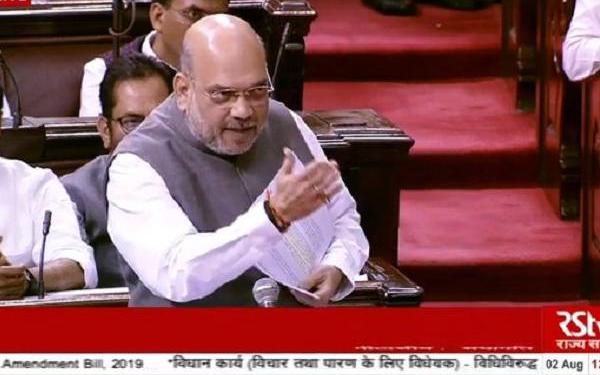In a big positive development coming from the upper house, the much critical Unlawful Activities (Prevention) Amendment (UAPA) Bill 2019 has been passed with 147 votes in favor and 42 votes opposition of the amendments. The motion to refer the bill to Select Committee was also rejected by the House with 104 against 85 votes.
Controversial MP Digvijaya Singh had doubted the intentions of the government and said “We doubt their(BJP) intent. Congress never compromised on terrorism that is why we had brought this law. It is you who compromised on terror, once during the release of Rubaiya Saeed ji and second by letting off Masood Azhar,”
To which union minister Amit Shah had replied “What happened during the Emergency? All media was banned, all opposition leaders were jailed. There was no democracy for 19 months, and you are accusing us of misusing laws? Kindly look at your past,”
Earlier the lower house of the Parliament had passed the Unlawful Activities (Prevention) Amendment Bill 2019 around a week ago on 25th July. While 287 members of the Lok Sabha voted in favor of the Bill, only had eight dissented. The Congress MPs staged a walkout, demanding that the Amendment Bill be sent to the Standing Committee for review, while Home minister Amit Shah justified the provisions vehemently.
The UAPA Bill seeks to crack down on terrorism by enacting stringent provisions. The Act already empowers the central government to designate an organization as a terrorist organization if it:
- commits or participates in acts of terrorism
- prepares for terrorism
- promotes terrorism, or
- is otherwise involved in terrorism.
The Amendment Bill provides for empowerment of the central government to designate individuals as terrorists on similar grounds. This will be a crucial addition to the powers of the central government to crack down on terrorists.
The UAPA Bill also seeks to additionally empower the NIA officers to seize property in the course of their investigations into terror-related cases. The amendment provides, “if the investigation is conducted by an officer of the National Investigation Agency (NIA), the approval of the Director General of NIA would be required for seizure of such property.” As per the existing Act, an Investigating Officer can proceed towards seizure of property connected with terrorism after taking the prior approval of the Director General of Police (DGP).
The existing Act provides for investigation of cases by the officers of the rank of Deputy Superintendent of Police or Assistant Commissioner of Police or above. The Amendment Bill seeks to additionally empower the officers of the National Investigation Agency (NIA) of the rank of Inspector or above, to carry out investigations. The passage of his bill will surely be a huge boost to India’s anti- terrorism efforts.

























